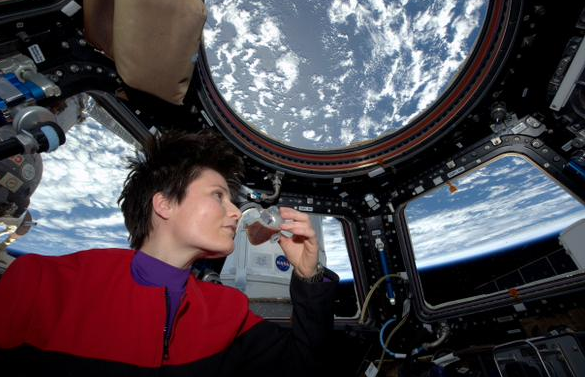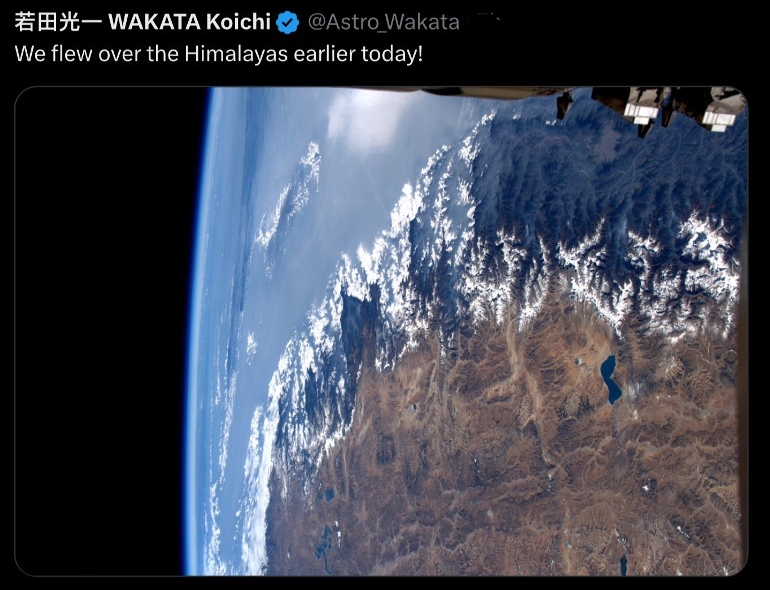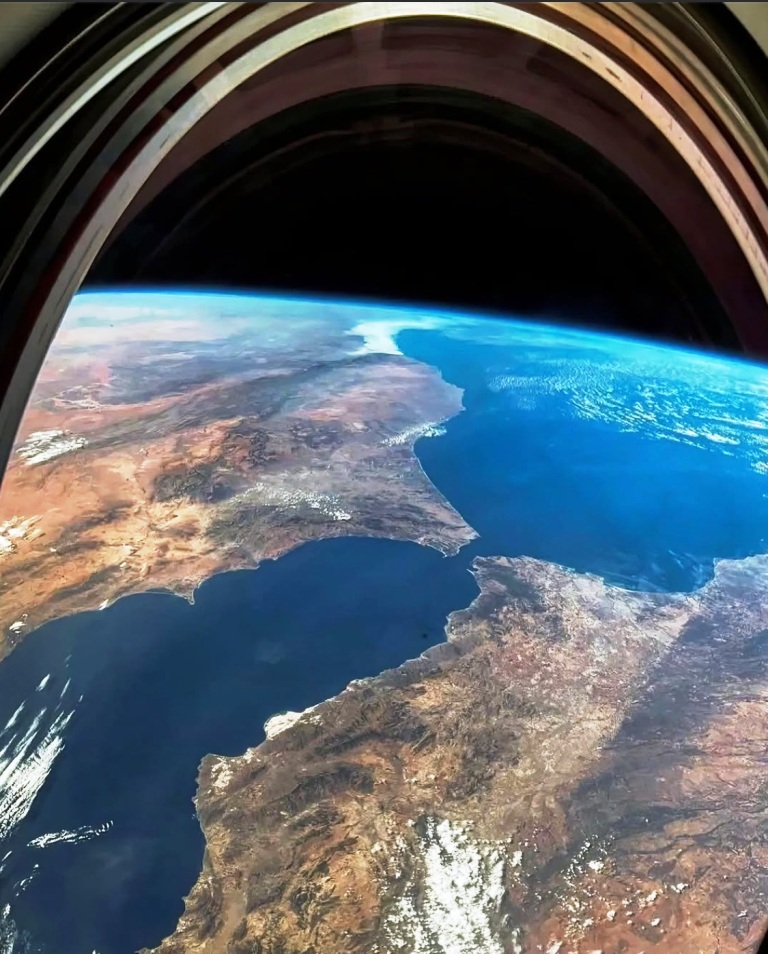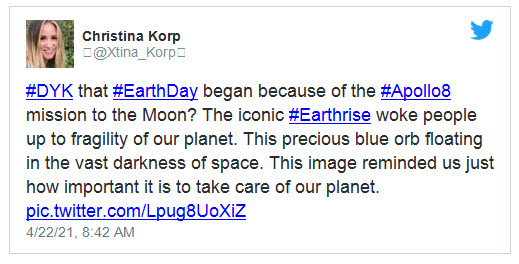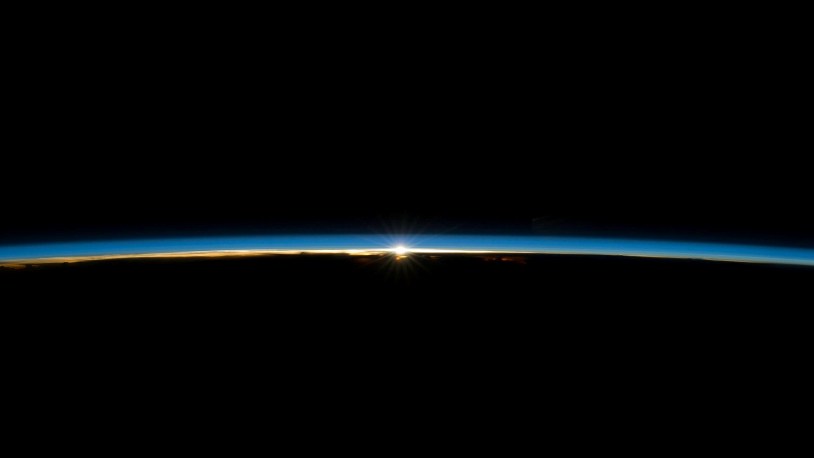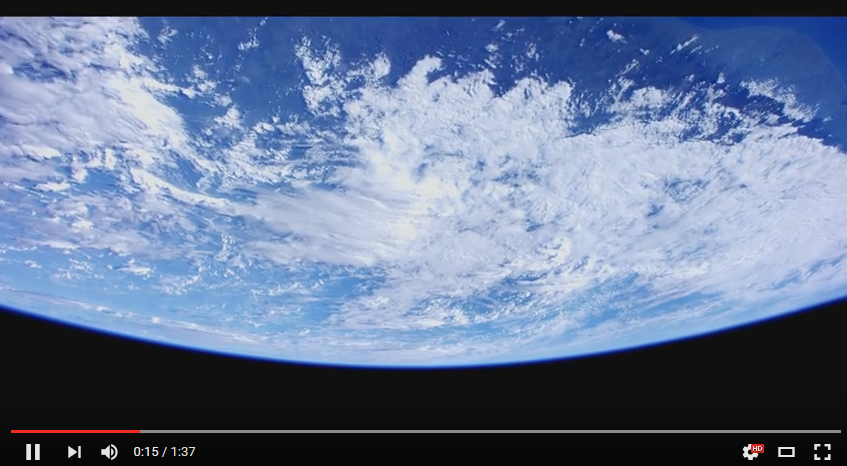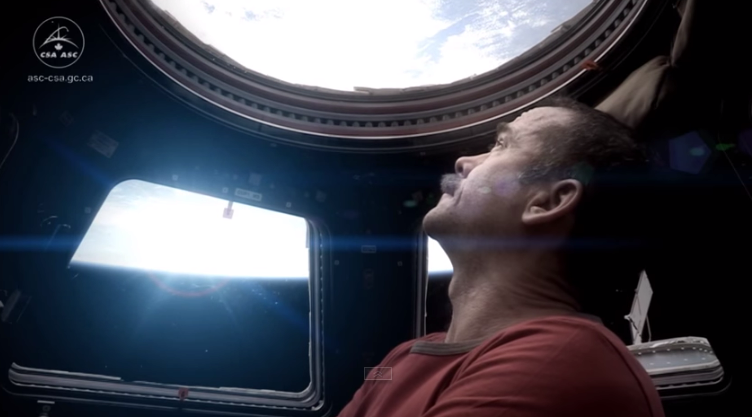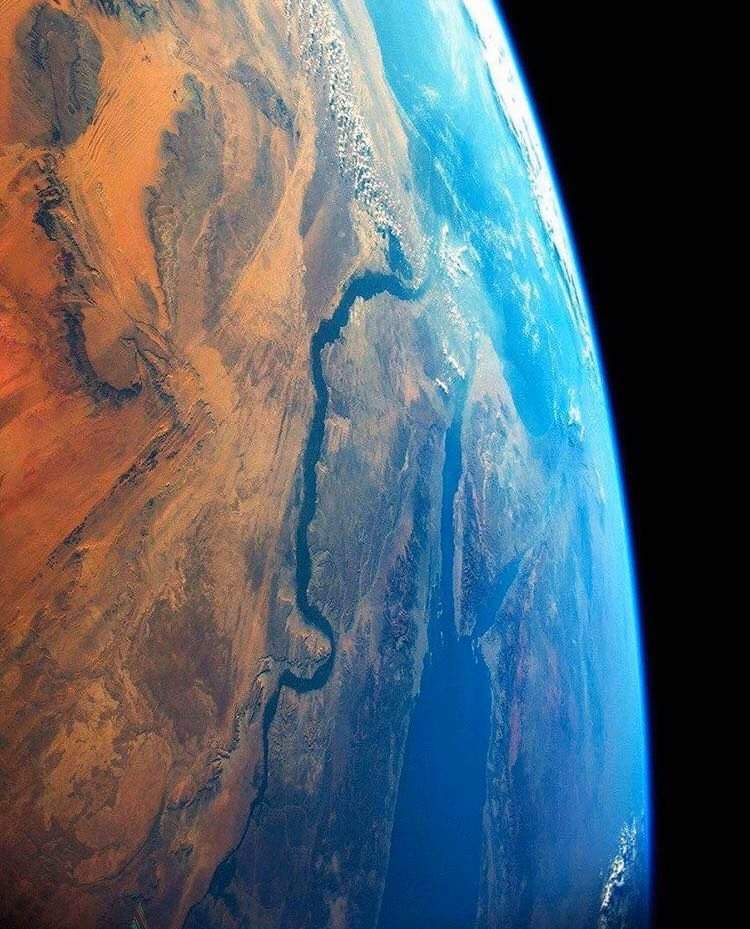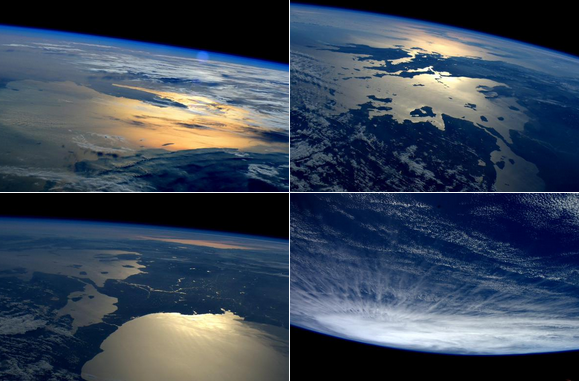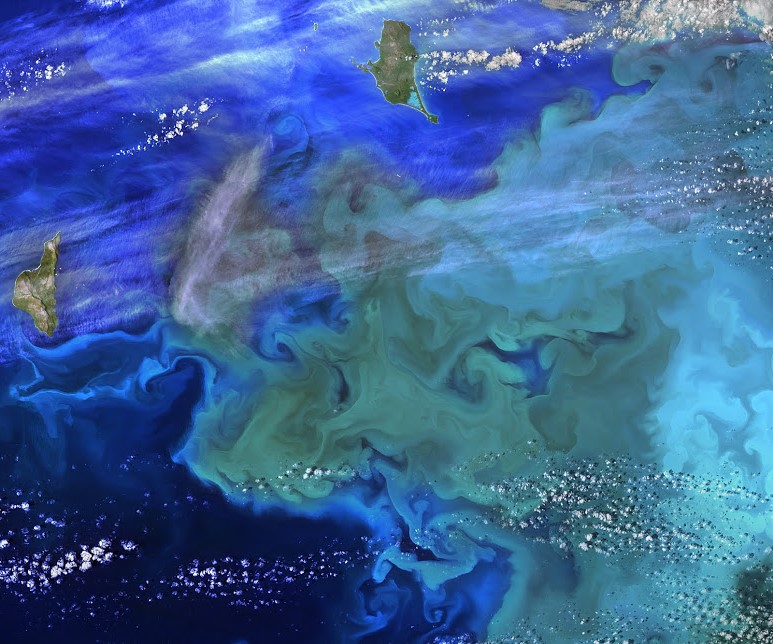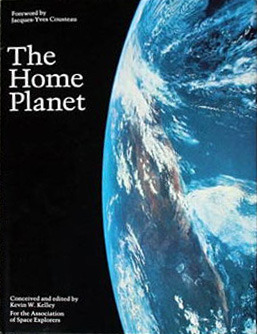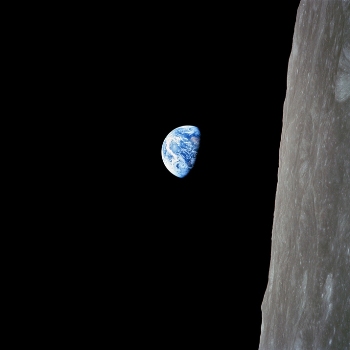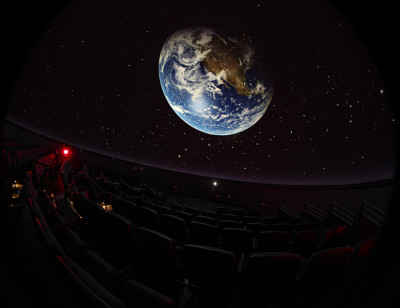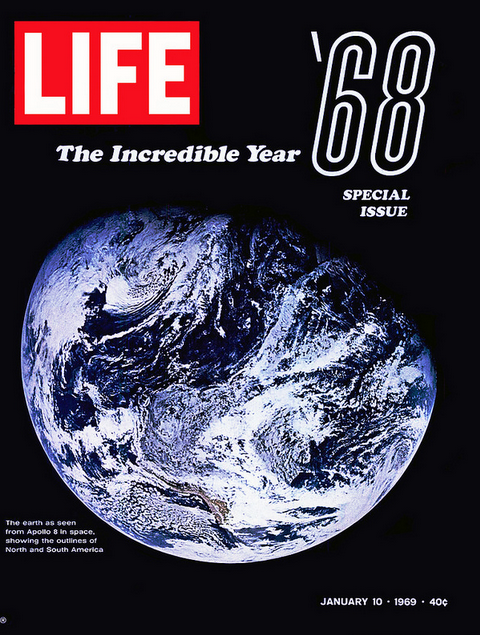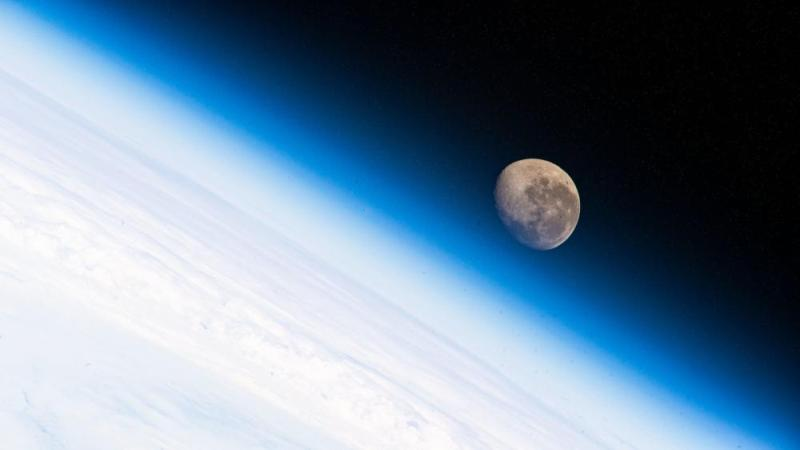Earthviews from Astronauts
Samantha Cristoforetti has breakfast espresso and (in Italian) says #HelloEarth to our home planet
Experiencing Planet Earth from Above
- A New Vision of Our Home Planet
Astronaut Wakata Koichi's View from the International Space Station Cupola Observation Window
From the Window of the International Space Station, a View of the Strait of Gibraltar, Africa to Europe
🌎
A Shared Vision
- Remembering the Surprise We Felt When We, Humanity, First Saw the 'Earthrise'
- The Earth rises into view from Out the Window of Apollo 8 (December 24, 1968)
- * https://www.greenpolicy360.net/w/File:Apollo.jpg
- A Whole Earth Point of View
- Steven Schmidt, GreenPolicy360 Siterunner....
- DYK? Yes, we know, we remember the beginnings !
- 'Earthrise' and 'Earth Day'
Beginnings of the Modern Environmental Movement
* https://greenpolicy360.net/images/1969_beginnings_of_the_modern_environmental_movement.pdf
🌎
NASA: Astronaut Views of Earth's Life-Enabling Atmosphere
Words of Astro-Explorers Seeing & Experiencing Earth as Alive
When we look down at the earth from space, we see this amazing, indescribably beautiful planet. It looks like a living, breathing organism. But it also, at the same time, looks extremely fragile... Anybody else who's ever gone to space says the same thing because it really is striking and it's really sobering to see this paper-thin layer and to realize that that little paper-thin layer is all that protects every living thing on Earth from death, basically. From the harshness of space. — Ron Garan, "Orbital Perspective"
To fly in space is to see the reality of Earth, alone. The experience changed my life and my attitude toward life itself. I am one of the lucky ones. — Roberta Bondar
I really believe that if the political leaders of the world could see their planet from a distance of 100,000 miles their outlook could be fundamentally changed. That all-important border would be invisible, that noisy argument silenced. (GreenPolicy360: with thoughts of the Overview Effect.) The tiny globe would continue to turn, serenely ignoring its subdivisions, presenting a unified façade that would cry out for unified understanding... The earth must become as it appears: blue and white, not capitalist or communist; blue and white, not rich or poor; blue and white, not envious or envied... Earth looks small, shiny, serene, blue and white, fragile... but appearances can be deceiving. It’s certainly not serene, but definitely fragile, and growing more so. The loss of habitat, the trashing of oceans, the accumulation of waste products — this is no way to treat a planet.” — Michael Collins
#Hello Earth ! Your mind is absorbing so many experiences, it feels like time expands. — Samantha Cristoforetti
🌎
Watch & listen to May Gods Love Be With You, in memory
To Our Planet Citizens Network 🌎
Be & Go & Discover the Beauty of Our Home Planet from Above
Begin to See & to Feel What Some Call --- "The Overview Effect"
A Sense of Our Place in the Universe, of Belonging, of the Stars We Are
• https://allthatsinteresting.com/pictures-of-earth-from-space
• https://www.pocket-lint.com/cameras/news/144794-amazing-images-from-the-international-space-station
Visit Astronauts' Pics of Earth
Siterunner Dave MacLean @DaveAtCOGS
GIS Faculty, Centre of Geographic Sciences (COGS); Fellow, Royal Canadian Geographical Society; co-Director, Esri Canada Centre of Excellence (COGS)
Mantra of site developer: "a picture is worth 1000 words; a map is worth 1000 pictures; a GIS is worth 1000 maps")
• http://www.arcgis.com/apps/Media/index.html?appid=203cc2c9ff05451e803aeb2a4f7a5fab
Pics taken by astronauts and cosmonauts during the International Space Station Missions 060 & 061 (and some by Christina H. Koch & Nick Hague in 059).
The basemap is Esri's Watercolour, created by Wes Jones, in Jun 2019.
The "moving ISS icon" updates every minute for ISS location. This is maintained in a separate feature service also updated via python. Occasionally, that process "is down" for a short while.
More such maps: https://isspix.com/MapTourHowTo, an index into 20+ missions since Jan 2013.
Photos & tweets are by astronauts & cosmonauts on-board the International Space Station.
Camera: Nikon D5. More info here. Watch ISS position real-time here.
The NASA high-resolution images are maintained here at Gateway to Astronaut Photography of Earth.
"Earthrise"
• https://www.greenpolicy360.net/w/Apollo_8
The sun truly "comes up like thunder", and it sets just as fast. Each sunrise and sunset lasts only a few seconds. But in that time you see at least eight different bands of color come and go, from a brilliant red to the brightest and deepest blue. And you see sixteen sunrises and sixteen sunsets every day you're in space. No sunrise or sunset is ever the same. — Joseph Allen on the ISS
Firefly meteorites blazed against a dark background, and sometimes the lightning was frighteningly brilliant. Like a boy, I gazed open-mouthed at the fireworks, and suddenly, before my eyes, something magical occurred. A greenish radiance poured from Earth directly up to the station, a radiance resembling gigantic phosphorescent organ pipes, whose ends were glowing crimson, and overlapped by waves of swirling green mist. 'Consider yourself very lucky, Vladimir,' I said to myself, 'to have watched the northern lights.' — Vladimir Remek
The Earth was small, light blue, and so touchingly alone, our home that must be defended like a holy relic. The Earth was absolutely round. I believe I never knew what the word round meant until I saw Earth from space. — Aleksei Leonov
For the first time in my life I saw the horizon as a curved line. It was accentuated by a thin seam of dark blue light—our atmosphere. Obviously this was not the ocean of air I had been told it was so many times in my life. I was terrified by its fragile appearance. — Ulf Merbold
I realized that that blue line, that really thin royal blue line, was Earth’s atmosphere, and that was all there was of it. And it’s so clear from that perspective how fragile our existence is. — Sally Ride †
You come back impressed, once you’ve been up there, with how thin our little atmosphere is that supports all life here on Earth. So if we foul it up, there’s no coming back from something like that. — John Glenn, Jr
I had heard of the 'Overview Effect' but, having done many extreme things in my life... skydiving, mountain climbing, visiting the Titanic and Antarctica, I didn't think it would greatly affect me... That is until I got into space! My life has changed because of my space experience. — Richard Garriott
From up there, it looks finite and it looks fragile and it really looks like just a tiny little place on which we live in a vast expanse of space. It gave me the feeling of really wanting us all to take care of the Earth. I got more of a sense of Earth as home, a place where we live, and of course you want to take care of your home. You want it clean. You want it safe. — Winston Scott
For those who have seen the Earth from space, and for the hundreds and perhaps thousands more who will, the experience most certainly changes your perspective. The things that we share in our world are far more valuable than those which divide us. — Donald Williams
There is a clarity, a brilliance to space that simply doesn't exist on earth, even on a cloudless summer's day in the Rockies, and nowhere else can you realize so fully the majesty of our Earth and be so awed at the though that it's only one of untold thousands of planets. — Gus Grissom †
Space is so close: It took only eight minutes to get there and twenty to get back. — Wubbo Ockels
We entered into shadow. Contact with Moscow was gone. Japan floated by beneath us and I could clearly see its cities ablaze with lights. We left Japan behind to face the dark emptiness of the Pacific Ocean. No moon. Only stars, bright and far away. I gripped the handle like a man hanging onto a streetcar. Very slowly, agonizingly, half an hour passed, and with that, dawn on Earth... First, a slim greenish-blue line on the farthest horizon turning within a couple of minutes into a rainbow that hugged the Earth and in turn exploded into a golden sun. You're out of your mind, I told myself, hanging onto a ship in space, and to your life, and getting ready to admire a sunrise. — Valeri Ryumin
I shuddered when I saw a crimson flame through the porthole instead of the usual starry sky at the night horizon of the planet. Vast pillars of light were bursting into the sky, melting into it, and flooding over with all the colors of the rainbow. An area of red luminescence merged smoothly into the black of the cosmos. The intense and dynamic changes in the colors and forms of the pillars and garlands made me think of visual music. Finally, we saw that we had entered directly into the aurora borealis. — Aleksandr Ivanchenkov
The Earth reminded us of a Christmas tree ornament hanging in the blackness of space. As we got farther and farther away it diminished in size. Finally it shrank to the size of a marble, the most beautiful marble you can imagine. That beautiful, warm, living object looked so fragile, so delicate, that if you touched it with a finger it would crumble and fall apart. Seeing this has to change a man, has to make a man appreciate the creation of God and the love of God. — James B. Irwin
Suddenly from behind the rim of the moon, in long, slow-motion moments of immense majesty, there emerges a sparkling blue and white jewel, a light, delicate sky-blue sphere laced with slowly swirling veils of white, rising gradually like a small pearl in a thick sea of black mystery. It takes more than a moment to really realize this is Earth; this is home! — Edgar Mitchell
We learned a lot about the Moon, but what we really learned was about the Earth. The fact that just from the distance of the Moon you can put your thumb up and you can hide the Earth behind your thumb. Everything that you've ever known, your loved ones, your business, the problems of the Earth itself — all behind your thumb. And how insignificant we really all are, but then how fortunate we are to have this body and to be able to enjoy loving here amongst the beauty of the Earth itself. — Jim Lovell
On the way back [from the moon] we had an EVA [extra-vehicular activity, spacewalk] I had a chance to look around while I was outside and Earth was off to the right, 180,000 miles away, a little thin sliver of blue and white like a new moon surrounded by this blackness of space. Back over my left shoulder was almost a full moon.... I didn't feel like I was a participant. It was like sitting in the last row of the balcony, looking down at all of that play going on down there... I had that insignificant feeling of the immensity of this, God's creation. — Charles Duke, Jr.
Several days after looking at the Earth a childish thought occurred to me that we the cosmonauts are being deceived. If we are the first ones in space, then who was it who made the globe correctly? Then this thought was replaced by pride in the human capacity to see with our mind. — Igor Volk
And in that moment, I was hit with the realization that this delicate layer of atmosphere is all that protects every living thing on Earth from perishing in the harshness of space. — Ron Garan
You see layers as you look down. you see clouds towering up. You see their shadows on the sunlit plains, and you see a ship's wake in the Indian Ocean and brush fires in Africa and a lightning storm walking its way across Australia. You see the reds and the pinks of the Australian desert, and it's just like a stereoscopic view of all nature, except you're a hundred ninety miles up. — Joseph Allen
Myriad small ponds and streams would reflect the full glare of the sun for one or two seconds, then fade away as a new set of water surfaces came into the reflecting position. The effect was as if the land were covered with sparkling jewels. — Karl Henize
The Pacific. You don't comprehend it by looking at a globe, but when you're traveling at four miles a second and it still takes you twenty-five minutes to cross it, you know its big. — Paul Weitz
Although the ocean's surface seems at first to be completely homogeneous, after half a month we began to differentiate various seas and even different parts of oceans by their characteristic shades... We were astonished to discover that, during an flight, you have to learn anew not only to look, but also to see. At first the finest nuances of color elude you, but gradually your vision sharpens and your color perception becomes richer, and the planet spreads out before you with all its indescribable beauty. — Wadimir Lyakhov
We were able to see the plankton blooms resulting from the upwelling off the coast of Chile. The plankton itself extended along the coastline and had some long tenuous arms reaching out to sea. The arms or lines of plankton were pushed around in a random direction, fairly well-defined yet somewhat weak in color, in contrast with the dark blue ocean. The fishing ought to be good down there. — Edward Gibson
My first view -- a panorama of brilliant deep blue ocean, shot with shades of green and gray and white -- was of atolls and clouds. Close to the window I could see that this Pacific scene in motion was rimmed by the great curved limb of the Earth. It had a thin halo of blue held close, and beyond, black space. I held my breath, but something was missing -- I felt strangely unfulfilled. Here was a tremendous visual spectacle, but viewed in silence. There was no grand musical accompaniment; no triumphant, inspired sonata or symphony. Each of us must write the music of this sphere for ourselves. — Charles Walker
It suddenly struck me that that tiny pea, pretty and blue, was the Earth. I put up my thumb and shut one eye, and my thumb blotted out the planet Earth. I didn't feel like a giant. I felt very, very small. — Neil Armstrong.
We have this connection to Earth. I mean, it's our home. And I don't know how you can come back and not, in some way, be changed. It may be subtle. You see difference in different people in their general response when they come back from space. But I think, collectively, everybody has that emblazoned on their memories, the way the planet looks. You can't take that lightly. — Nicole Stott
"The feeling of unity is not simply an observation... With it comes a strong sense of compassion and concern for the state of our planet and the effect humans are having on it." — Yury Artyukhin
If somebody'd said before the flight, "Are you going to get carried away looking at the earth from the moon?" I would have say, "No, no way." But yet when I first looked back at the earth, standing on the moon, I cried. — Alan Shepard
As we got further and further away, it [the Earth] diminished in size. Finally it shrank to the size of a marble, the most beautiful you can imagine. That beautiful, warm, living object looked so fragile, so delicate, that if you touched it with a finger it would crumble and fall apart. Seeing this has to change a man... has to make a man appreciate the creation of God and the love of God. — James Irwin
Now I know why I'm here. Not for a closer look at the moon, but to look back at our home, the Earth. — Alfred Worden
There was a startling recognition that the nature of the universe was not as I had been taught… I not only saw the connectedness, I felt it... I was overwhelmed with the sensation of physically and mentally extending out into the cosmos. I realized that this was a biological response of my brain attempting to reorganize and give meaning to information about the wonderful and awesome processes that I was privileged to view... You develop an instant global consciousness, a people orientation, an intense dissatisfaction with the state of the world, and a compulsion to do something about it. From out there on the moon, international politics look so petty. You want to grab a politician by the scruff of the neck and drag him a quarter of a million miles out and say, ‘Look at that, you son of a bitch. — Edgar Mitchell
Suddenly, from behind the rim of the Moon, in long, slow-motion moments of immense majesty, there emerges a sparkling blue and white jewel, a light, delicate sky-blue sphere laced with slowly swirling veils of white, rising gradually like a small pearl in a thick sea of black mystery. It takes more than a moment to fully realize this is Earth... home.... We went to the Moon as technicians; we returned as humanitarians. — Edgar Mitchell
Something about the unexpectedness of this sight, its incompatibility with anything we have ever experienced on earth elicits a deep emotional response... Suddenly, you get a feeling you’ve never had before... That you’re an inhabitant... of the Earth. — Oleg Makharov
A tear-drop of green. — Ron McNair
Intellectually, I knew what to expect. I have probably looked at as many pictures from space as anybody.. so I knew exactly what I was going to see... But there is no way you can be prepared for the emotional impact... It brought tears to my eyes. — Don Lind
The first day or so we all pointed to our countries. The third or fourth day we were pointing to our continents. By the fifth day, we were aware of only one Earth.” — Sultan bin Salman Al-Saud
What beauty. I saw clouds and their light shadows on the distant dear earth.... The water looked like darkish, slightly gleaming spots.... When I watched the horizon, I saw the abrupt, contrasting transition from the earth's light-colored surface to the absolutely black sky. I enjoyed the rich color spectrum of the earth. It is surrounded by a light blue aureole that gradually darkens, becoming turquoise, dark blue, violet, and finally coal black. — Yuri Gagarin (Юрий Алексеевич Гагарин)
When you're finally up at the moon looking back on earth, all those differences and nationalistic traits are pretty well going to blend, and you're going to get a concept that maybe this really is one world and why the hell can't we learn to live together like decent people... I think the one overwhelming emotion that we had was when we saw the earth rising in the distance over the lunar landscape . . . . It makes us realize that we all do exist on one small globe. For from 230,000 miles away it really is a small planet... The view of the Earth from the Moon fascinated me — a small disk, 240,000 miles away. It was hard to think that that little thing held so many problems, so many frustrations. Raging nationalistic interests, famines, wars, pestilence don't show from that distance. — Frank Borman, Apollo 8, Life magazine, 17 January 1969
This planet is not terra firma. It is a delicate flower and it must be cared for. It's lonely. It's small. It's isolated, and there is no resupply. And we are mistreating it. Clearly, the highest loyalty we should have is not to our own country or our own religion or our hometown or even to ourselves. It should be to, number two, the family of man, and number one, the planet at large. This is our home, and this is all we've got. — Scott Carpenter
Looking outward to the blackness of space, sprinkled with the glory of a universe of lights, I saw majesty - but no welcome. Below was a welcoming planet. — Loren Acton
We Are Stars
You see how diminutive your life and concerns are compared to other things in the universe... The result is that you enjoy the life that is before you… It allows you to have inner peace. — Edward Gibson
There is a clarity, a brilliance to space that simply doesn't exist on Earth, even on a cloudless summer's day in the Rockies, and nowhere else can you realize so fully the majesty of our Earth. — Gus Grissom †
There, contained in the thin, moving, incredibly fragile shell of the biosphere is everything that is dear to you, all the human drama and comedy. That's where life is... — Loren Acton
It’s beyond imagination until you actually get up and see it and experience it and feel it. — Willie McCool †
The actual experience exceeds all expectations and is something that's hard to put to words… It sort of reduces things to a size that you think everything is manageable.... All these things that may seem big and impossible ... We can do this. Peace on Earth – No problem. It gives people that type of energy ... that type of power, and I have experienced that. — Anousheh Ansari
I left Earth three times. I found no place else to go. Please take care of Spaceship Earth. — Wally Schirra
○ ○ ○ ○ ○ ○ ○ ○ ○ ○ ○ ○ ○
Planet Citizen Vision of Living Earth
- The Home Planet
by Kevin Kelley
Published by Addison-Wesley and Mir
Introduction by Jacques-Yves Cousteau
Preface by Russell Schweickart
Preface by Oleg Makarov
○ ○ ○ ○ ○
Outward
Space Walk
Going to the Moon
Observations
Space Stations
Reflections
○ ○ ○ ○ ○
- Interrelated
"We all understand that the life systems of this planet are interrelated, that our human future depends on the well-being of the rain forest and the salt marsh. We know that human activity in the production of goods and services can damage and destroy the environment on which we and our children depend. We know all these things intellectually. Yet we feel related to all people when we see pictures of mothers and children, tears of sorrow and joy, laughter, music, and dance. And we fear together the misuse of the power we have now at our collective fingertips. What the experience of seeing this amazing planet from space does is to take it beyond the intellectual and into the personal..."
○
"Within seconds of attaining Earth orbit, every cosmonaut, without exception, be they a dry, reserved flight engineer or a more emotional pilot, uttered the same sort of confused expression of delight and wonder... Anyone who has seen the Earth from space knows that it is an incomparable sight. It's not just that the planet is piercingly beautiful when viewed at a distance; something about the unexpectedness of the sight, its incompatibility with anything we have ever experienced on Earth, or known, or practiced, elicits a deep emotional response."
"Those who have been in space realize that, in spite of the complete disparity between them, they are one in an important way, namely, an acute feeling of being an inhabitant of Earth, a feeling of a personal responsibility to preserve the only planet we have."
○
"I am walking on a round planet hurtling around the Sun at 62,000 miles an hour, turning at 1,000 miles an hour at the Equator, producing day and night. I will be aware of our Sun as the center of a Solar System that is moving around Galaxy at more than 500,000 miles an hour, and of the whole Galaxy itself hurtling in a direction unknown to me at an unimaginable speed through an ever-expanding universe populated with billions of other galaxies stretching to eternity. I think this sense of wonder at our universe and the strangeness of our lives within our tiny party of it is important to our sense of ourselves and perhaps to our very survival... great beauty, the incredible wonder, and the unfathomable mystery of all this as it unfolds in the eternal moment."
○
"The Home Planet is a photographic psalm book... a religious text without a sermon." — Ray Bradbury
○
"What struck me most was the silence. It was a great silence, unlike any I have encountered on Earth, so vast and deep that I began to hear my own body: my heart beating, my blood vessels pulsing, even the rustle of my muscles moving over each other seemed audible. There were more stars in the sky than I had expected. The sky was deep black, yet at the same time bright with sunlight. The earth was small, light blue, and so touchingly alone, our home that must be defended like a holy relic. The Earth was absolutely round. I believe I never knew what the word round meant until I saw Earth from space." (Translated from Russian, on a first spacewalk) — Алексе́й Архи́пович Лео́нов - Aleksei Leonov
On 18 March 1965, Aleksei became the first human to conduct extra-vehicular activity (EVA). He explained there were no 'textbooks', no 'guides to follow' for a human first-ever spacewalk. "I climbed out of the hatch unhurriedly and gently pushed myself away from it, moving farther and farther away from the ship. This slight effort made our spacecraft begin to turn slowly before my eyes..."
"I set out into the unknown and nobody on Earth could tell me what I would encounter... It was clear that I had to be very careful. Take it easy, take it easy, I told myself, do not move too quickly."
Fifty Years On - March 2015 / http://rt.com/news/242173-space-walk-anniversary-friendship/
- 50 yrs after 1st spacewalk: Bond between Russian & US spacemen is still strong
Alexey Leonov became the first man to walk in space, and later went on to take another historic step: the famous US-Russian handshake in space. Leonov made friends with a US astronaut on that mission, and the close bond has continued through the years.
Ten years after Leonov’s historic spacewalk, he went on a joint space mission with US astronaut Tom Stafford. This initiated a close friendship, and a symbolic one: their handshake in space was a sign to many that the Soviet Union and the US could deal with the issues between them.
“It was a demonstration to the whole world that two countries with different languages, different units of measurements, and certainly, greatly different political systems, could work together for a common goal,” Tom Stafford told RT’s Gayane Chichakyan, who visited his Florida home.
Before their mission together, in 1975, Stafford and Leonov planted a tree in Star City, in Russia.
However, their friendship went far beyond the final frontier.
Some years ago, Alexey Leonov helped the Staffords to adopt two Russian boys.
“I lived in Russia, and I got to know the Russian people. I knew the characteristics, and I wanted two Russian sons. And it’s worked out great.”
Stafford’s youngest son, Stas, is now 20 years old, and the elder son Michael went to Russia to study at a company where Alexey Leonov is the boss.
“His [Leonov’s] granddaughter is named after my daughter, and my grandson’s middle name is Alexey, named after him. We’re very close friends, we’re like brothers,” Stafford said.
George Abbey, former director of the Johnson Space Center and Fellow in Space Policy at the Baker Institute of Rice University, and a fierce defendant of all Russian-US cooperation in space, even during the Cold War, has told RT that cosmonauts and astronauts have always managed to put politics aside.
“I think we’ve been very good so far in keeping space away from the politics, and we have an excellent relationship with our Russian colleagues on the ISS, and we share a common goal and a common vision,” Abbey said.
“Hopefully, we will continue to do that, as it might set an example of how we can work together here on the Earth, because we work very well together in space...”
○ ○ ○ ○ ○ ○ ○ ○ ○ ○ ○ ○ ○ ○ ○
- "Overview - An Immersive Experience"
Like an Astronaut - New Ways of Seeing
- "We Are Planetary"
- "Orbital Perspective"
- "Space Travelers"
'Earthrise' ... Planetary Awareness
[Beginnings of the Modern Environmental Movement
🌎
"We saw the 'Big Picture' of Planet Earth Rising on the Cover of Life"
On the 50th Anniversary
- Memories on the Road to the First Earth Day
- By Steve Schmidt
Looking Back, Looking Forward
An Astronaut and now U.S. Senator, Mark Kelly Remembers and Talks about Protecting the Home Planet
As 2017 Rolls Past and Astronaut Mark Kelly Remembers Viewing Planet Earth
CNN
December 27, 2017
In 2001, I flew my first flight into space aboard Space Shuttle Endeavour. Roughly a decade later, I commanded that same space shuttle on its final flight. That trip was my fourth journey – and at least for now, my final one – from this planet into space.
To see our planet as this majestic blue ball floating in the blackness of space is breathtaking. It is truly the most amazing thing I’ve ever seen. When you see it for the first time it appears perfect. Bright and mostly blue, it’s a literal island in our solar system. And make no mistake – right now, we have no place else to go.
Too often, we forget that this remarkable and fragile place is our only home, a point that was underscored earlier this month at the largest gathering of Earth scientists in New Orleans.
At the conference, the National Oceanic and Atmospheric Administration (NOAA) made a sobering announcement. It came as part of a study of climate change on 2016’s weather. The scientists behind the study concluded that without climate change, three of the most severe weather events that took place that year would not have happened. Which events?
1. Heat waves that scorched parts of Asia, including India and Thailand, killing more than 500 people. 2. A patch of unusually warm water in the Pacific Ocean that’s had harmful effects on marine life along the coast of North America. 3. And rising air temperatures that made 2016 the hottest in recorded history.
Climate News
The impact of climate change – the scars that it’s leaving on our planet – is visible from above, too.
There is visible pollution over large portions of the Earth. You often see this over the Asian sub-continent. The burning of wood and plastic and other materials to heat the homes of hundreds of millions of Indians creates a thick smoke over thousands of square miles.
In China, the problem is more industrialized and more severe. Coal power plants and millions of cars have polluted the skies over eastern China to the extent that I can honestly say I don’t believe I have seen the terra firma of eastern China during my four missions into space. It is hidden by a constant blanket of tiny airborne particles of despair.
Perhaps the thing that worries me the most is the massive deforestation underway in areas like Asia and Latin America. Countless trees and millions of square miles of jungle and forest have been removed to accommodate our desires for more – more wood, more farmland, more pasture, more meat.
When I first looked down upon the Amazon rainforest in 2001, I saw vast areas of jungle and a wide and winding copper colored river that went on and on and on. A river that was impossible to miss and like no other on the planet. By 2011, however, the part that was most noticeable wasn’t the river or the jungle but the large swaths of empty land.
From space, it looks empty because we are far away. We don’t see the crops or the cattle but we do see the loss. We see the loss of an incredibly diverse ecosystem that once held endless possibilities for new medicines and other discoveries.
We see the loss of a home for so many species that will now have to learn to adapt and survive somewhere else – or not. And we see the loss of a large amount of carbon, sequestered in a living and breathing ecosystem which created massive amounts of oxygen for all of us.
That carbon, once the giver of life to millions of species all over our planet, now has a new role: greenhouse gas. It will sit in our atmosphere as CO and CO2 for millennia, but in this case as an invisible blanket, warming our planet, changing our climate and creating a cataclysmic mess for future generations.
As an astronaut, I’m often asked about the climate, our environment, and how we are destroying the Earth. My response often surprises people. “Don’t worry about the planet, the Earth will be just fine,” I tell them. “What you need to worry about is us – all of us.”
This year (2017) has been an unequivocal disaster for the future of the planet. President Donald Trump has managed to take a wrecking ball to years’ worth of hard work and painstaking negotiations. If not undone, our retreat from the Paris Climate Accords and the EPA’s Clean Power Plan alone mean our planet’s temperature will rise at a greater rate and our citizen’s health will degrade. Other changes in environmental regulations on drilling and auto and appliance efficiency will only make matters worse.
The United States was handed the mantle of leadership on this and so many other issues decades ago for a reason. It is because we are good at it.
Our President has an obligation to look closely at the raw data on climate change. If he does, I think he will reach the same conclusion that I and so many others have reached.
As you pass over the United States in space at night you can see, with your own naked eye, the bright lights that prove we lead the world in energy consumption.
It is very obvious. What’s not obvious is whether our country will adequately respond to this reality. As the largest consumer of energy we must lead the way in solving this problem. If we don’t do this, who will?
- Additional Website Resources - Linked Data - Green Best Practices
- Anthropocene
- Earth
- Earth Imaging
- Earth Observations
- Earth Science from Space
- Earth360
- EarthPOV
- Eco-ethics
- Eco-Quotes
- Eco-Spirituality
- Ecology Studies
- Global Security
- Environmental Protection
- ESA
- GreenPolicy360
- Orbital Perspective
- Overview Effect
- Planet Citizen
- Planet Citizens
- NASA
- ThinBlueLayer
- Whole Earth
